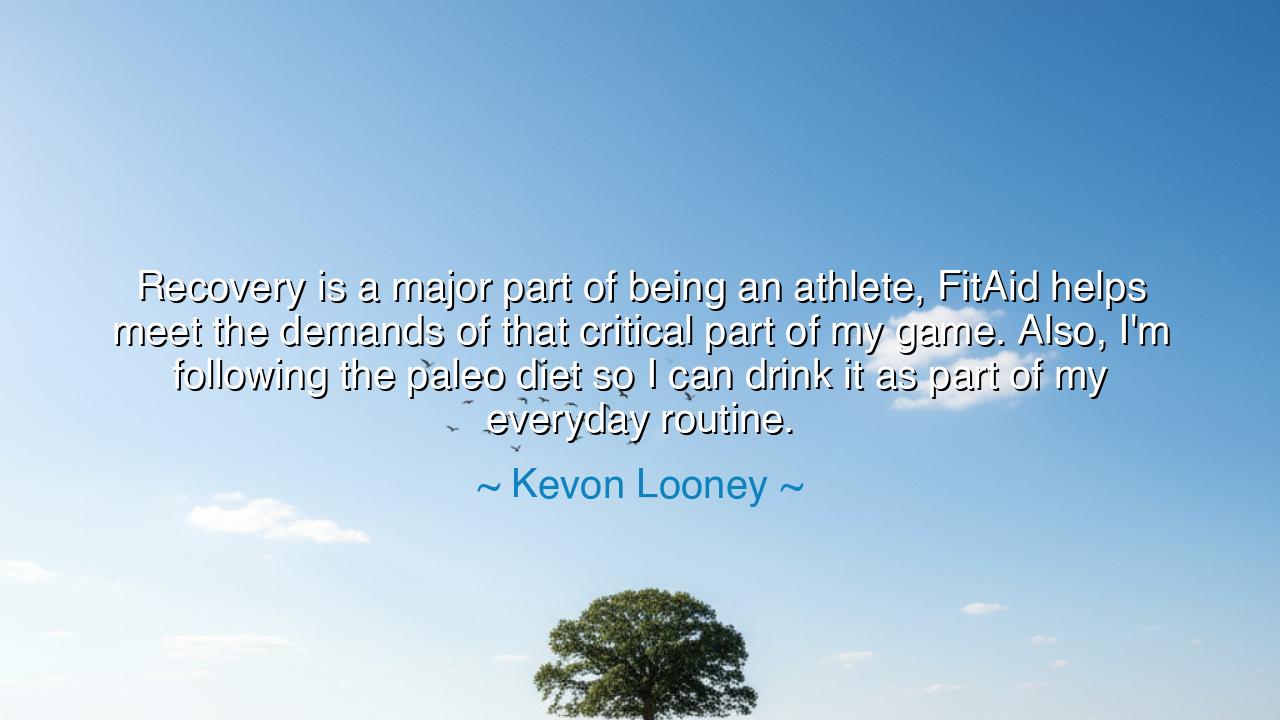
Recovery is a major part of being an athlete, FitAid helps meet
Recovery is a major part of being an athlete, FitAid helps meet the demands of that critical part of my game. Also, I'm following the paleo diet so I can drink it as part of my everyday routine.






In the words of Kevon Looney, the warrior of the court and the keeper of discipline, there echoes a truth known to both athletes and philosophers: “Recovery is a major part of being an athlete. FitAid helps meet the demands of that critical part of my game. Also, I’m following the paleo diet, so I can drink it as part of my everyday routine.” These words are more than a statement of fitness—they are a reflection on the eternal cycle of effort and renewal, of strain and restoration, that governs all forms of mastery. Looney speaks not merely of physical recovery, but of the ancient rhythm that sustains all strength: the balance between fire and stillness, between exertion and peace.
In every age, men have chased greatness by pushing the limits of the body and the will. But the wise have always known that rest is not weakness—it is the secret half of power. The soldier sharpens his sword after battle; the farmer lets his field lie fallow before planting anew; the athlete must heal before he conquers again. Looney, through his devotion to recovery, shows that victory is not found only in motion, but in stillness well used. His words remind us that the hero who never pauses will one day fall to exhaustion, but the one who honors renewal endures beyond the fleeting moment of triumph.
The ancients knew this truth. The philosopher Aristotle wrote that excellence is not a single act, but a habit—a harmony of body and soul sustained through balance. The warriors of Sparta, though famed for their relentless training, were taught to sleep deeply, eat wisely, and guard their strength as treasure. Even the mighty gladiators of Rome, who lived and died by combat, were given elixirs of herbs and oils to mend the body after each clash. For they understood what Looney speaks of now: that recovery is sacred, the bridge that transforms effort into endurance.
Looney’s choice of the paleo diet—to eat as the ancients did—is not merely a matter of health, but of philosophy. It is a return to the primal wisdom of nature, to the simplicity of foods that nourish without corruption. The modern athlete, surrounded by artifice and abundance, finds purity not by adding, but by subtracting—by cutting away what is false and returning to what is real. In his daily practice, Looney mirrors the ancients’ way: to eat clean, to train hard, and to rest with intention. And in his mention of FitAid, he does not glorify a brand but honors a tool—an instrument to serve a greater purpose: the preservation of balance.
There is a tale from the East of a swordsman who trained without rest, seeking perfection. For years he practiced until his body trembled and his mind broke. One day, his master took away his sword and commanded him to do nothing for three days. When he returned to the blade, he moved like the wind—free, fluid, unstoppable. The master said, “Now you have learned the secret of rhythm: to rest is to prepare.” Looney’s understanding is of this same lineage. His recovery is not idleness, but preparation made sacred.
The lesson in his words reaches beyond sport. In every pursuit—whether art, study, or work—the heart that never rests will wither, and the mind that never pauses will grow dull. One must learn the art of balance: to push fiercely, then to heal deliberately. Let your recovery be as purposeful as your striving. Sleep deeply. Eat wisely. Drink what restores you. Reflect, breathe, and give your strength time to return stronger.
And so, Kevon Looney’s wisdom becomes a teaching for all who labor toward greatness. The path of mastery is not a sprint, but a cycle—a dance between tension and release, between action and recovery. The ancient blacksmith did not strike the metal endlessly; he placed it in water to cool, for that was how it hardened. So too must we learn to rest with purpose, that our own spirits may be tempered and strong.
For the true athlete, the true creator, the true human being, understands this: recovery is not the end of effort—it is the continuation of it. To honor rest is to honor growth. To recover well is to rise again, renewed and unbreakable. In that eternal rhythm of work and restoration lies the wisdom of all enduring strength—and the quiet power that shapes both body and soul.






AAdministratorAdministrator
Welcome, honored guests. Please leave a comment, we will respond soon